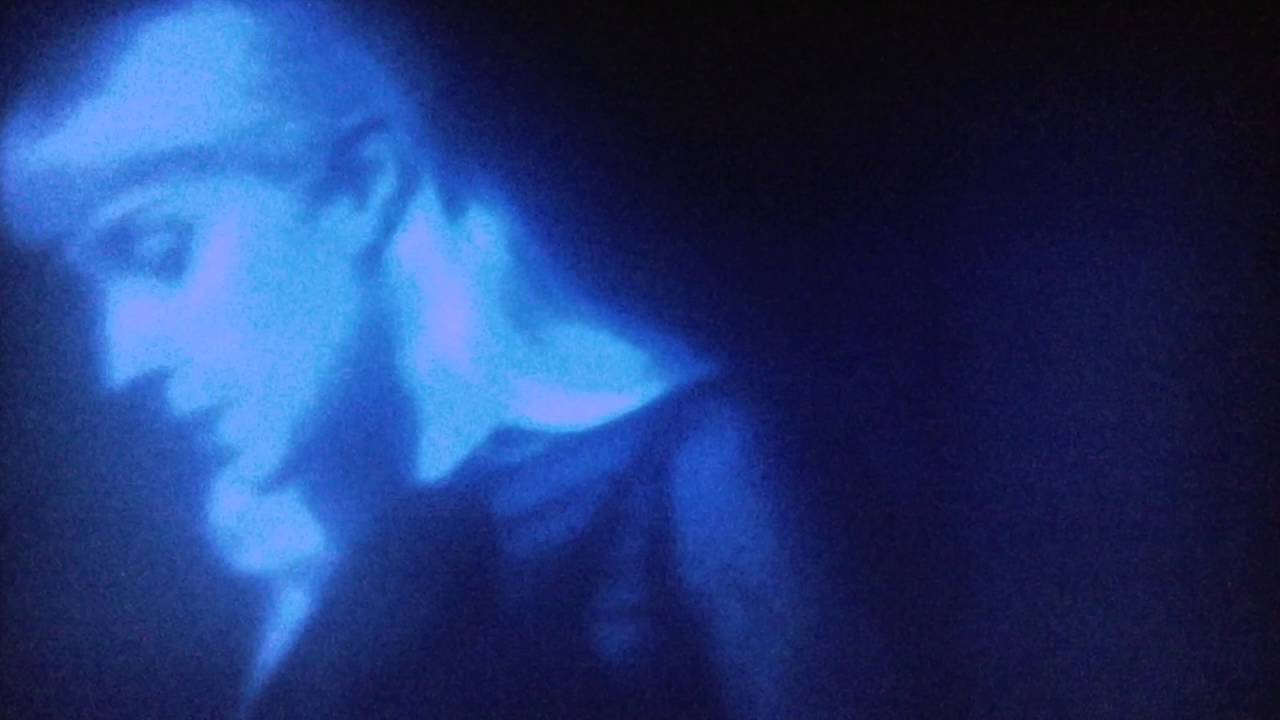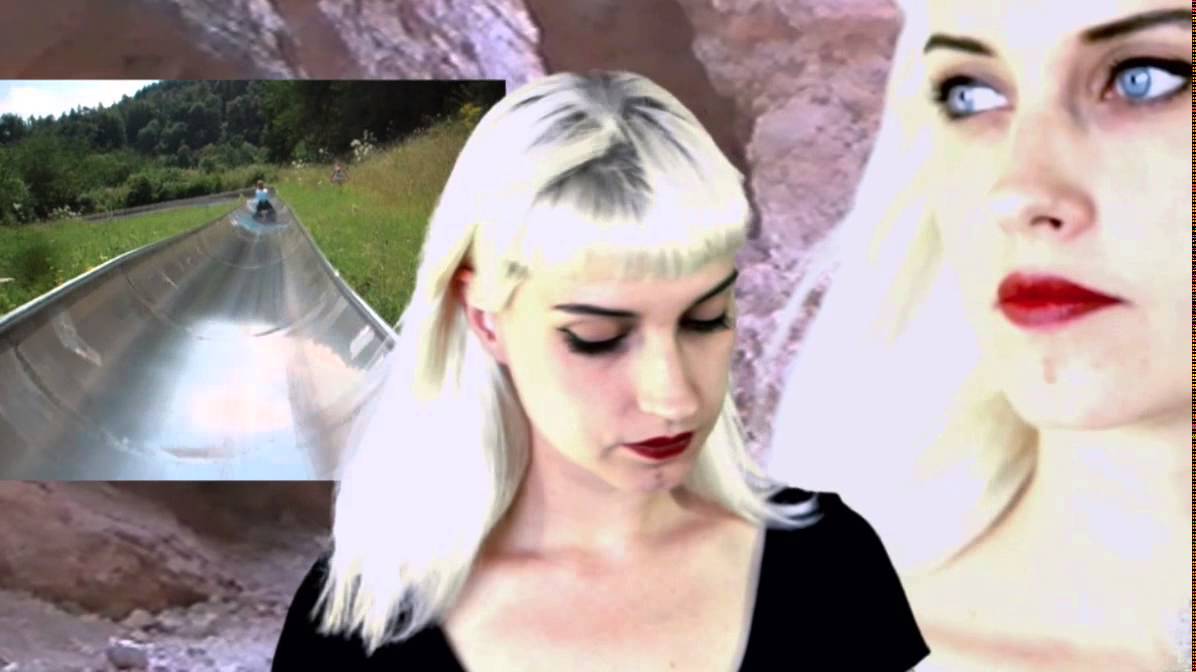The term ‘DIY’ appears almost everywhere Molly Nilsson is written about. Taking complete control over every aspect of her career – the recording of her deep, steely electronic pop, the design of her stark album art, the booking of her own gigs at which she performs alone on an unadorned stage – it’s easy to see how her work might well be seen as somewhat homespun. Yet for the Stockholm-born, now Berlin-based artist, the term can too easily imply a sense of amateurism, undermining, perhaps, the astonishing creative drive that characterises her work.
"The word seems to suggest like I’m just making buttons, and that everything else is just corporate," she says. "I feel like there should be another word, a more sophisticated term, because it’s just an approach to working as an artist, a more philosophical attitude than just, ‘I made this.’ It seems like such an old-school expression. I would like to think of myself not as DIY but just as ‘doing it’, you know?"
Nilsson’s force of unflinching individualism isn’t hard to detect. Her six albums to date have been released both with ceaseless regularity and dependable excellence over the last eight years, and from the moment the thick, warped electronica of last autumn’s Zenith saw the light of day, she instantly turned her attention to her seventh, lest she lose momentum. "I work on a certain tempo," she says. "Collaborations can be cool but they can slow you down. Working on everything myself just makes sense. I wish I could make apps, make all the music videos and everything else too, but at some point you’ve got to outsource."
The only thing that slows Nilsson down in her creative pursuit is the decidedly less glamorous world of administration, conducted through her own label, Dark Skies Association. Although a partnership with her "extended family on the British Isles", the Glasgow indie label Night School Records, has eased the workload on distribution since 2013’s The Travels, touring and booking is still hers to oversee. "It’s pretty boring, I’d rather write songs than emails," she concedes, "but it’s also my way of keeping things small. I’m not a control freak, but I don’t want what I’m doing to become like a business."
Nilsson has, in the past, declared distrust for the music business at large, though clarifies she’s still a "happy fan" of the mainstream. "I enjoy listening to music and I love pop music, so I’m not really ‘against’ the industry, not in that sense. I just felt that for my own work I wanted to show myself – and maybe other people as well, but mostly myself – that I could get really far without ever signing a contract with anyone, not having anyone stand behind me and say ‘we made her’. I want to be able to say ‘I made me.’"
She is intent to keep things small in scale, and sees achievement in her work entirely on her own terms. When asked what exactly would constitute success, Nilsson answers with an assured immediacy that’s unusually forthright, even by her own standards: "Success is just making a really amazing album." It could be argued that she’s already made many, but the craft alone remains her concern. "I’ve come to this point in my career where I have a lot of experience in the flow of things, with popularity, how it comes and goes with hype and stuff like that. Right now I’m doing quite well and I’d be happy if everything could be like it is now, but on the other hand I know, and I’ve seen that it will come and go. I’m just going to keep making music for as long as I think it’s fun and I have something to say."
Keeping things modest and, to employ a second cliché with which she’s often labelled, ‘cult’, has the added effect of an intensely intimate relationship with her fans. With Dark Skies Association lacking the financial clout – and most likely the desire – for large-scale promotion, and Nilsson’s gigs consciously aimed toward an ideal of around 300 people, her music is designed to be properly discovered.
"It’s not shoved down anyone’s throat, everyone will find my music by themselves, and then everyone feels like they’ve found something secret. Anyone who finds my music does so because of some weird coincidence. I think it’s cool when I play shows and I’m talking to people and they will always have some story about how they discovered my music or something that happened while they were listening to my music. It’s fun for me to know it’s part of people’s lives."
Nilsson talks much about her desire for an "active" audience, those who want to "step inside someone’s world" when they listen to her records. One of the reasons Nilsson decided not to upload any of her music to Spotify after her debut is that streaming an album renders the listening experience the opposite. She would much rather have her listeners indulge on YouTube, a format that’s "more active somehow, like you’re really in search of something. There’s a video or image, suggestions down the side. Spotify is too background-y, like you’ve got a restaurant and a chill dining playlist, or you’re at the office and you just want some sounds playing.
"I’d rather have people sit up having YouTube marathons listening to my music – that’s my ideal way for people to listen to my songs. I would also encourage people to download off Pirate Bay, I think that’s also a more active way of listening; it’s almost as active as buying an LP or putting on a record."
Playing live, too, she extends the personal touch, performing without background visuals to leave "just the stage as an image; people are looking at [it] and making their own performance in their mind". She puts great impetus on this connection, "the intimacy between me and the audience, every listener by themselves alone". Naturally, Nilsson continues, her approach simply wouldn’t work if she didn’t keep things at the size they are. "I couldn’t go on stage in front of 50,000 people and try to connect with each and every one of them; that would just be a lie."
Festival sets and outdoor gigs she generally evades for fear of having to compete for attention "against the whole world", although she makes an exception for London’s Field Day this Sunday thanks to PJ Harvey’s headline set. "I just couldn’t say no. I was also supposed to play a festival in the US where Laurie Anderson was playing but I couldn’t work the visa thing out. Sometimes I do stuff like that just to put it on paper that I did it."
Any abstract notion of fame has never been of much interest. Even as her fan base swells in number, Nilsson says she’s never felt famous, though concedes that: "Sometimes I can be in situations where I realise that someone who I don’t know knows who I am, and it’s kind of strange. I’m a pretty shy person and it can be uncomfortable to think about. I’d like to think that it’s the music that’s famous, not me, if anything’s famous."
It’s almost a contradiction that Nilsson has such a firm desire to separate her music from herself as much as possible, when her appeal relies so heavily on a sense of intimate connection, and she agrees it would be impossible to properly make the split. "I do release everything under my own name, and my lyrics are very personal, everything has a touch to it that is very me. But of course there is so much more to me than just my music. It’s a balance. I think it’s why I don’t want things to get carried away and I want to keep things smaller. It’s just to protect myself."
"And integrity is very important," she goes on. "Today, with how connected we are, it’s really difficult to feel that you can just be. Everything begins from the moment it happened to be immortalised on Facebook or Instagram. When you’re playing a show for instance you don’t want to be thinking about how the video’s going to look, or ‘What if someone takes a photo of me and everyone can see it?’ This is not about me as an artist, it’s about our age and our time, where a lot of integrity has been lost, and confused with privacy. I think integrity is the privacy of the soul."
There are two sides to Molly Nilsson, on the one hand she shies from attention, keeping her craft discreet so as not to spoil her intense individualism, yet once the limelight’s hers she basks in it: the smaller the audience, the easier she inspires their devotion. It’s something she’s aware of, and is clearly conscious of treading the right line between enigma and idol; sustaining a fan base by virtue of prolific effort without sacrificing the personal touch. Before we speak, she’s been debating the implications of the appearance of her first ever Wikipedia page. The writer got her birthday wrong, and it’s a rare chink in her armour of detachment from the personal. "I was just wondering if I should care. I shouldn’t, but it’s kind of annoying. Should I edit my own page? But that’s really fucked up…" she thinks aloud before regaining composure. "You’ve caught me at an embarrassing moment."
Her seventh record comes at an "interesting time" for the singer. It’s due for completion imminently – "it’s like I’m in labour and my waters could break any moment" – and will be released with Nilsson both at the peak of her powers and approaching a wider breakthrough of success that might well be a leap into uncertain ground. "Right now I’m doing quite well, I’d like to freeze things as they are at the moment, but I always have to keep making music."
Either way, she’ll continue to be unforgettable, at the very least. "I went to a bar once and the guy working there said, ‘It’s funny, I have a playlist and you’re on it. There’s this one song we have from you but we don’t play it very often because it’s too invasive, it doesn’t work in the background,’" she recalls, when asked how she’d like to be received beyond ‘DIY’. "I thought that was cool, I’d just like to sing in a way that can’t be ignored."
Zenith is out now on Dark Skies Association/Night School. Molly Nilsson plays Field Day in Victoria Park, London, on Sunday, June 12; for full details and tickets, head here





